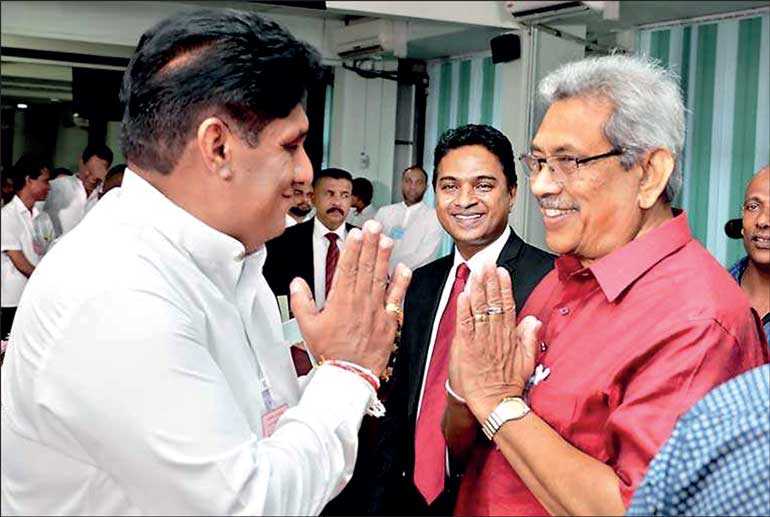by Viruben Nandakumar, Tamil Guardian, London, November 11, 2019
Even if one is to grant that Premadasa is the lesser of two evils, an issue arises with these narratives, for they sanitise his image and place false airs upon him. If Tamils are to vote for Premadasa it is not because he is a radically distinct or even acceptable candidate. He may be a lesser evil, but still an evil nonetheless.
The greater evil

“You talk about human rights, you talk about freedom of individuals, you talk about reconciliation, but all these depend on national security […]. If you don’t have national security, what happens? Do you have freedom? Everything depends on national security.” – Gotabaya Rajapaksa, 2019
Gotabaya’s role as Defence Secretary during the final stage of the armed conflict has not been forgotten; nor have the tens of thousands of innocent civilians corralled into alleged safe-zones, only to be shelled into oblivion. Tamils have not forgotten their loved ones who surrendered to the military during those finals days and who have not been seen since. Their protest to know the fates of their loved ones have continued for almost a thousand days. Tamils have not forgotten the abductions, tortures and disappearances ordered by Gotabaya through his “white van squads”.
Gotabaya’s presidential bid has not attempted to significantly distance himself away from such accusations, but instead has hardened his depiction as Sri Lanka’s “strong man”. To Gotabaya, any freedom that those on the island enjoy are secondary to ‘national security’, protection of the status quo, and any attempt at dissenting against the Sinhala nationalist hegemony is treated as an existential threat.
An illusion of hope: The “good governance” regime
“Our country is now entering a decisive juncture in its history. Whether the country would turn towards becoming a haven for peace, prosperity and reconciliation or whether it would fall into the abyss of degeneration, instability and anarchy depends on the way you act today.” – Maithripala Sirisena, 2015
In 2015, the victory of Maithripala Sirisena over Mahinda Rajapaksa was heralded as a new crossroads. In the lead up to the election, Sirisena made appeals to the Tamil community and positioned himself as an alternative to Rajapaksa; as someone who would deliver on promises of reconciliation. It was the support of the Tamil community that allowed Sirisena to narrowly defeat Rajapaksa in 2015 by 3.7% of the general vote.
Sirisena’s supposed commitment to reconciliation was supported by the co-signing of UN resolution 30/1 and the establishment of the Office of Missing Persons. Over the years the glacial progress and the lack of accountability in these projects showed that these gestures were hollow and had no political will backing them. These years were further accompanied by a greater militarisation of the Tamil homeland. Tamils, who had little faith in these gestures, to begin with, have become entirely disillusioned with the politics of the “good governance” regime.
Political commentators have insisted on the parallels to the 2015 election, but the most salient difference between Sirisena’s presidential bid and Premadasa’s is that he has dropped the pretence of caring about Tamil demands. Premadasa has refused to discuss the key political demands made by the major Tamil political parties. He has not only denied the need for international involvement into Sri Lanka’s accountability process but actively promoted those accused of grotesque war crimes. He has appointed Sarath Fonseka as the head of the military and pledged to protect Shavendra Silva. Premadasa has not visited Tamil communities to hear about their concerns but has instead vied with Gotabaya for the backing of the Sinhala Buddhist majority.
Dysfunctional Democracy
On 16 November, Tamils will go to the polls and will be forced to vote not between “two mutually opposing political projects” but instead between two candidates who are very much united in their defence of a Sinhala ethnocracy. Amidst a growing dissatisfaction with Sri Lanka’s electoral system, this represents a failure of the island’s supposedly democratic process, as there are no real alternatives to the dominant ideology of Sinhala nationalism. Deep structural reforms are needed. Partial solutions have been discussed, such as shifting the terms of the presidential election from a winner takes all contest to support proportional representation and alternative voting. Here citizens may vote freely for the candidate which best represents them without sacrificing their principles. Yet, even if this were the case it would not resolve the foundational issue of Sinhala nationalism which continues to plague the island in almost every form of electoral politics. The fact that a significant number of Sinhalese voters will willingly vote for a candidate credibly accused of war crimes, corruption and intimidating reporters speaks volumes.
The island’s democratic institutions cannot be saved by a single candidate. Instead, it demands a reconceptualisation of its democracy. Instead of an inward and overtly nationalist outlook, which both candidates represent; what is needed is a willingness to confront the horror of the past; to commit to accountability and reconciliation, and a respect for self-determination. If Sri Lanka continues on its current trajectory, the ability to deliver on said commitments is doubtful and the future will indeed be bleak.
Viruben Nandakumar is a staff writer at the Tamil Guardian. He holds a Masters in Political Theory from the London School of Economics and a Bachelors in Politics at the University of Nottingham.
